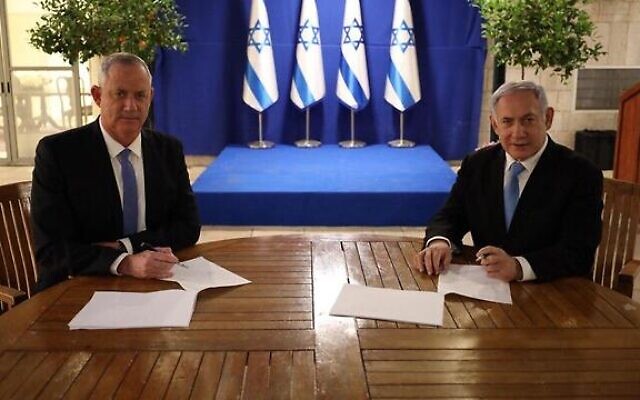The deep distrust between Netanyahu and Gantz shapes every facet of the new coalition deal, transforming the nascent government into a two-headed hydra of contradictory impulses
By Haviv Rettig Gur, TOI

Prime Minister Benjamin Netanyahu and Blue and White party leader Benny Gantz in the Knesset, November 10, 2019. (Yonatan Sindel/Flash90)
Israel’s 35th Government began to come into focus on Monday with the signing of a coalition agreement between Benjamin Netanyahu and Benny Gantz.
And what a strange government it is.
In that it avoids a fourth consecutive election in the midst of a coronavirus pandemic, it may be a laudable achievement. But scratch the surface of the 14-page agreement and one finds that the “unity” government being celebrated by the two leaders is a bloated, bifurcated regime shaped by the deep distrust upon which it was built.
So much about the accord is unprecedented that it is best to simply set the term aside and just take things as they come.
The agreement sets the government’s lifespan at 36 months, and divides it into two parts: a six-month “emergency period” and a longer “unity period” to follow.

Prime Minister Benjamin Netanyahu, center, with Defense Minister Naftali Bennett of Yamina, Interior Minister Aryeh Deri of Shas, Health Minister Yaakov Litzman and MK Moshe Gafni of United Torah Judaism at a meeting of the heads of the right-religious bloc, at the Knesset, March 4, 2020. (Yonatan Sindel/Flash90)
During the emergency period, which Gantz and Netanyahu can extend in three-month increments by mutual agreement, no legislation can be advanced that doesn’t either contend with the coronavirus emergency or is approved by both men.
That is, for the duration of the emergency period, each has a veto on legislative initiatives. There is one exception: annexation of parts of the West Bank, which Netanyahu is free to try to advance from July 1.
Blocs
“The government will be a two-bloc government,” declares Article 2. And it isn’t kidding.
The government’s fundamental structure is shaped by the two alliances led by Netanyahu and Gantz, the “Likud bloc” and the “Blue and White bloc.”
This is no simple matter of optics. Gantz and Netanyahu are each granted enormous power over their “blocs.” Each can fire a minister from his bloc, a power usually reserved for the prime minister alone. And neither — even if they happen to be a prime minister — can fire a minister from the other’s bloc.

Blue and White leader Benny Gantz (left) and Prime Minister Benjamin Netanyahu sign their unity government agreement on April 20, 2020. (GPO)
Similarly, to move an agency or some legal power from the hands of one ministry to another would normally require the approval of the prime minister. No longer: it is now the head of the relevant bloc who must approve the move. Whatever branch of government is granted to the “Likud bloc” under the agreement becomes Likud’s fiefdom, and the same for Blue and White.
The government’s most basic structures, its most powerful committees — such as the security cabinet, which has the power to declare war, or the ministerial legislation committee — are divided between the blocs, with each bloc holding an equal number of members.
What little mention is made of specific policy priorities is also splintered along those lines. The right’s most prominent achievement — the coveted go-ahead for an annexation of some unspecified portion of the West Bank — is also the only item on the new government’s agenda that Blue and White isn’t required to support.
Meanwhile, Gantz won nearly everything he needed in his bid to show that he was fulfilling his vow to “defend democracy” and liberal values.
Likud was disarmed of the three ministries from which it led its culture war against the left: justice, communications and culture. Former speaker Yuli Edelstein, who defied a direct High Court order to convene a plenum vote on his successor (arguing it was an illegal imposition of the court’s will on the legislature) won’t return to the speaker’s chair.
Gantz did cede some ground on the Judicial Appointments Committee, responsible for selecting High Court justices. Though he got a member of his bloc on the nine-person panel, that MK, Derech Eretz’s Zvi Hauser, is a right-wing conservative who is likelier to side with the other bloc on such appointments, and could effectively give the right a veto on judge picks.

Benny Gantz (L) and Gabi Ashkenazi at a Blue and White campaign event in Kfar Saba on February 12, 2020. (Gili Yaari/ Flash90)
Distrust and verify
Each side is given sweeping powers to stymie the other side. Gantz and Netanyahu must agree on every item placed on the cabinet’s agenda. In the “emergency” phase, each has a straightforward veto on all legislation. In the later “unity” phase, Gantz’s justice minister — slated to be MK Avi Nissenkorn — will chair the powerful Ministerial Committee for Legislation, which gives the government’s imprimatur to new bills and whose decisions both blocs have committed to follow, but Likud will hold the deputy chairmanship. Both chair and deputy must agree on the committee’s agenda.
Then there are the astoundingly convoluted mechanisms by which each man hopes to force the other to fulfill their side of the bargain.
Gantz got a guarantee that if Netanyahu pushes a vote through the Knesset to dissolve the parliament and call early elections before Gantz has fulfilled his term as prime minister, then Gantz is automatically the interim prime minister in the months until a new government is sworn in. That is, Netanyahu will have to leave the PM’s chair no matter what.
Netanyahu, meanwhile, won the right to resign early from the premiership, let Gantz have his 18 months, and then return to complete his term — allowing him to enter the next election as prime minister once again.
Gantz is required to resign along with Netanyahu if Netanyahu is ruled unfit to serve as prime minister by the High Court of Justice in the first six months of the coalition’s lifespan — a measure Netanyahu believes will make the justices of the High Court think twice about removing him.

Small business owners and kindergarten teachers take part in a rally demanding financial support amid the coronavirus lockdown, across from the Knesset in Jerusalem, on April 19, 2020. (Yonatan Sindel/Flash90)<
At every turn, each man gets some guarantees that the other will find it in their interest to uphold the agreement.
In other words, each believes that the other may renege at every turn.
Incoherence
The new government will struggle to function as a coherent organization. With a central policy-making process not only missing but nigh unattainable in the bifurcated “blocs” formalized in the agreement, individual ministries and the ministers who lead them will find themselves free of the kind of mandatory coordination and centralized control that governments can usually impose on their disparate parts.
Take for example the West Bank settlements that will seek to capitalize on any Israeli declaration of sovereignty in the coming months to encourage a growth in population and economic development. The heads of controversial outlying settlements will undoubtedly find a sympathetic ear in the right-wing-led ministries of transportation or housing — both vital to their development — but will face a colder reception in the ministries of agriculture and economy, on which their livelihoods depend and which are slated to be led by the Gantz bloc’s Blue and White and Labor respectively in the new cabinet.
Will the new government support those settlements or try to limit their growth? Both.

Blue and White party leader Benny Gantz speaks to reporters near the West Bank settlement on Migdal Oz, after yeshiva student Dvir Yehuda was killed in a terror attack, on August 8, 2019. (Gershon Elinson/Flash90)
What will the government’s economic policy look like with a finance minister hailing from economically liberal Likud and an economy minister, Labor’s Amir Peretz, who entered politics through the trade unions?
And so on.
Put all that together — the division of all things by “blocs,” the mutual vetoes, the compliance mechanisms each has tried to impose on the other, the policy chaos that is likely to ensue — and the new government’s fundamental character comes into view.
Israel’s 35th Government is being billed by Likud and Blue and White as a “unity government,” but it is more likely to be defined by its disunity, and to be overwhelmed from the start by the mutual suspicion and petty politicking that drove the past year’s political deadlock.



”
“The Economic Crisis Will Kill More People Than the Virus, Warns Israeli HMO Head
The CEO of Israeli health maintenance organization Maccabi Healthcare Services Ran Saar spoke with Calcalist about the coronavirus pandemic
Adrian Filut and Adi Pick15:0521.04.20
TAGS: Coronavirus Covid-19 HMO Maccabi Economy
The economic crisis stemming from the coronavirus (Covid-19) pandemic will kill more people than the virus itself, Israeli health maintenance organization (HMO) Maccabi Healthcare Services CEO Ran Saar said in a recent interview with Calcalist.
“I hear the cries of the self-employed and small business owners . Such a person is on the verge of suffering a medical event due to stress, pain, and fear, and this can manifest itself into a mental or physical condition. The loss to the economy will be mad. When we are done with the coronavirus and the healthcare system will no longer be in everyone’s focus, because of the poor economic situation, there will be no money for healthcare,” Saar said.
Maccabi Healthcare Services CEO Ran Saar. Photo: Orel Cohen Maccabi Healthcare Services CEO Ran Saar. Photo: Orel Cohen
“It is quite clear that it is impossible to really renew the economy’s activities without bringing the education system, at least for the young children, back online” he said.
“Today, it is also clear to the Ministry of Health that the right move was to pass the treatment on to the HMOs directly: they know the job, and they conduct 20 million unrelated tests per year,” he added. “Send us the tests and you’ll get results within 24 hours.” From Times of Israel.
@ Shmuel Mohalever:
90% of the US aid to Israel (as well as the US aid to other countries) is supposed to be spent on purchasing American-made weaponry and military equipment.
This “financial aid” is nothing more than an indirect subsidy to the American military-industrial complex.
A major reason why Israel is run the way it is IS BECAUSE it is constantly appeasing the US.
Israel is NOT a sovereign country.
Israel is not really interested in aliyah or Zionism, otherwise it wouldn’t be so picky-picky. It is far more interested in the “rich American Jews” staying where they are and sending money to Israel.
I am wondering what will happen to that idea after the “rich American Jews” are shaken down by the coronavirus-induced Depression (euphemistically called Recession).
From my own experience (from 12 years ago), when you apply, you have to show your debts, your income, your preexisting health conditions AND obtain permission from your long ago divorced spouse or spouses (if you can find them) to leave. That’s in addition to the “proof of Jewishness”.
And you also should be able to afford a test trip to Israel and have at least $20,000.00 available for your first year there (that was 12 years ago, now it’s probably $40,000.00 – because “there is no inflation”, I guess).
Also, there is this propaganda about how you should CHOOSE to make aliyah (it is more noble, somehow).
@ Shmuel Mohalever:
I have always told you have a right to your views. I also told I do not find you credible and do not value your views. It still stands.
@ Bear Klein: Bear, you have consistently claimed that it is you who determines who “has a right” to express an opinion on any issue that interests you. You have claimed the right to determine what people can reply to you on this website. You have repeatedly disparaged and insulted those who disagree with you. This should stop.
You have sought to control the debate on all the issues discussed on this sight with online bullying of your opponents. That should not be tolerated.
People who seek to supress dissent by bullying and insulting opponants are almost always people who know their own positions are indefensible based on the facts. Their only way to persuade others that they are in the right is to intimidate or silence those who disagree with them.
In my opinion, Israpundit should ban online bullying in the future.
“Transport Minister Betzalel Smotrich criticized the judgment by Be’er Sheva Magistrate’s Court Judge Orit Lipshitz, who accepted the “LGBT Association’s” claim against a printing press that refused to create and print banners with LGBT content.
“It’s an insane, grievous, and outrageous judgment requiring a person who keeps Torah and commandments to act contrary to his belief in his private business. Stark secular coercion,” Minister Smotrich tweeted.” FRom today’s Arutz Sheva. This ruling, which grossly violates the print shop owners freedom of religion, (he had been asked to print up banners for a “gay pride” parade), shows why judicial reform in Israel is desperately needed. The present “unity government” will never permit the enactment of such reform. It might have been enacted under a right-bloc government, if the present Justice Minister, an opponent of judicial tyranny, had remained in office, or had been replaced by someone, such as Yariv Levin, with similar views about the judiciary.
Americans who have earned the right to have a say in running Israel, have made aliyah. I believe the number of these true Zionists are about 150,000. Many have served in the IDF or other security branches. A handful have even made it to the Knesset or Ambassador positions. Many are scattered in professional positions across the Israeli economy.
Like any country, to truly understand Israel one must learn the language and live in the country. Otherwise you are just an outsider (Jew or not) with limited perspective and credibility. There are non-Israelis who have contributed to Israel they have have come as early as the Independence War in 1948 when Jewish pilots volunteered to provide Israel its first air force.
A friend of mine was the head US Engineer to build airfields for Israel after they withdrew from the Sinai. He spent several years in Israel doing this. There are volunteers to the Kibbutzim who stayed anywhere from six months to several years helping on Israeli farms. There are many other examples.
The Israeli ruling elites, whether politicians, judges, lawyers, bureaucrats, academics, journalists, even the military and police chiefs,–are such a bunch of appeasement-orinted, cowardly assholes that the U.S. should end all aid to Israel until/unless the system is reformed, and new, patriotic (and pro-American) leaders, preferably hand-picked by Donald Trump on the advice of the ZOA.